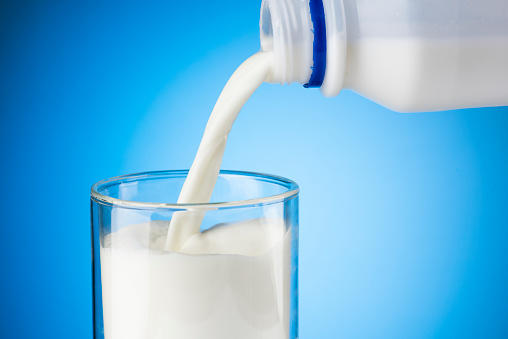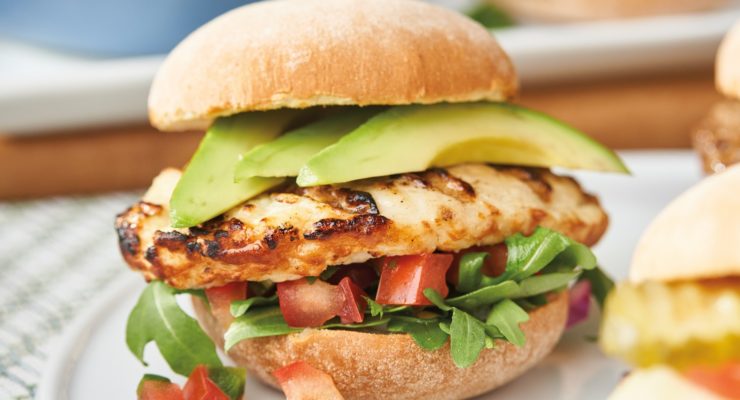Grocery Shopping 101: Your Guide to the Dairy Aisle
Article posted in: Nutrisystem for Men
Losing weight with a Nutrisystem plan is so easy because much of what you eat each day comes to you in perfectly sized portions that are nutritionally balanced. But you also make healthy choices on your own when you shop for supplemental foods, such as the PowerFuels found in the dairy case. Learning to sort through all of the selections in the supermarket will keep you on track toward your weight loss goal and help you maintain a healthy diet for the rest of your life.
The supermarket’s dairy section offers you so many choices that are both delicious and healthy, but it’s also stocked with lots of options that can slow your weight loss progress. And it can be challenging to tell the difference.
Here’s how to find the best foods for you:
Before we get into specific products, let’s go over how milk, cheese, yogurt and eggs fit into your healthy diet. Dairy products of all kinds are rich in protein, which provides you with steady energy and helps you feel full. You also get a valuable dose of bone-boosting calcium from dairy foods. Phosphorus and magnesium, abundant in dairy items, enhance the beneficial effects of calcium.
A study published in the medical journal Obesity found that “obese adults who ate a high-dairy diet lost significantly more weight and fat than those who ate a low-dairy diet containing the same number of calories.” The researchers also found that eating dairy foods was associated with reduced body fat, especially in the abdominal area, helping you to look thinner and reduce your risk of heart attacks and related problems.
Milk
Your milk options have broadened dramatically in recent years. In addition to milk from dairy cows, you can also pick goat’s milk, and “milks” made from soybeans, almonds or coconut, and even lactose-free milk. All of those alternatives are sensible choices for people who have difficulty digesting lactose, a type of sugar unique to dairy foods. Non-dairy milks are high in protein and comparatively low in fats, but they have less calcium than cow’s milk. You can also pick from four different types of dairy milk: Whole (3.25 percent fat), reduced fat (2 percent), low-fat (1 percent) and fat-free or skim (0 percent). Each has about eight grams of protein and 30 percent of your RDA for calcium, while ranging from eight grams of fat, to five, to two-and-a-half, to zero. Just be sure to watch out for added sugars, and opt for unsweetened versions.
Best choices: A one-cup serving of fat-free milk is a PowerFuel, because it is loaded with protein. A cup of unsweetened soy, almond or coconut milk also qualifies as a PowerFuel that fits into your Nutrisystem weight loss plan.
Yogurt
The yogurt section of the dairy case presents even more choices. You’ll find whole, reduced, low-fat and non-fat choices, and alternatives made from soybeans, almonds, and coconut, just like in the milk section. There also are Greek, Swiss and Nordic styles. And all of them come in flavors from simple vanilla to varieties that sound like desserts, such as chocolate truffle and key lime pie. Most important, bear in mind that flavored yogurts—even those with fruit—can be loaded with sugar, simple carbohydrates that burn quickly and leave you hungry not long after eating.
Best choices: One cup of plain non-fat Greek has about 15 to 20 grams of protein, about 60 percent more than the standard yogurt. The Greek type also has about half the carbs but about 30 percent less calcium (because of the draining process). If you want to add flavor, use fresh or frozen fruit. It’s also a healthy base for a savory dip for fresh vegetables.
Cheese
We often think of delicious cheese as an indulgence, but with the right choices it can fit into your healthy diet. Whole milk cheese, except in a few cases, is high in saturated fat and often loaded with sodium. But you also get protein–about seven grams in an ounce of cheddar, 10 grams in Parmesan. Look for low-fat and low-sodium versions of many popular types.
Best choices: In general, the harder the cheese the better it’s protein to fat ratio. One-percent-fat cottage cheese makes an ideal PowerFuel for breakfast, lunch or snack, because it gives you lots of energy with the fewest calories.
Eggs
You won’t find many sources of lean protein better than an egg. You get about seven grams in each one, along with iron and iodine, a mineral that’s essential for healthy thyroid glands, key players in your metabolism. An average egg has five grams of fat and 75 calories. Eggs keep you feeling full long after eating them, according to nutrition researchers from Wayne State University. Their study subjects who ate eggs for breakfast were more satisfied through the morning and ate fewer calories for lunch than those who ate bagels.
Best choice: Boiled, poached, scrambled or fried (using only non-stick spray), a single large egg is a healthy PowerFuel that can satisfy your hunger and provide you with energy at any time of day.










